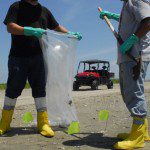BP plans to turn over the processing of personal claims on Aug 23, when the responsibility will fall to federal independent administrator Ken Feinberg, a company spokeswoman told an oil spill task force on Monday.

Cities, counties and the state, however, will continue to work with the oil company to settle millions in claims for protective measures taken and clean-up efforts underway following the biggest oil release in the nation’s history.
Mary Shafer-Maliki, retired BP vice president and company deputy incident commander for Florida, told the Oil Spill Recovery Task Force that the company currently has no plans to outsource the government claims, at least for now.
“Nothing changes ’til it changes,” said Shafer, underscoring the evolving nature of the disaster, cleanup and reimbursement efforts.
State officials are concerned that BP may shutdown the claims process before all damage has been properly assessed. Setting aside an escrow account for government expenses, a pool of cash similar to the $20 billion set aside for private claims, would go a long way toward easing fears of local communities that stepped up quickly to respond.
“It gives everybody in the state peace of mind that we are trying to get it out of (BP’s) hands,” said Rep. Jimmy Patronis, R-Panama City.
Appointed by Gov. Charlie Crist, the task force is looking at ways to speed up the claims process for local governments that spent money on boom and other items, some of which in hindsight weren’t needed.
The House Deepwater Horizon Response and Recovery Working Group continues to meet – with discussion scheduled throughout this week – and eventually will make its own slate of recommendations after hearing from affected parties in Tallahassee, Panama City and Pensacola. Estimates collected for that group show the state has spent $75 million on cleanup and recovery efforts.
Feinberg is slated to visit the Panhandle Tuesday to meet with local officials as he prepares to take over the private claims process now being handled by BP. The oil company has paid more than $300 million in claims to more than 40,000 claimants so far. Feinberg, who will oversee a $20 billion escrow fund for businesses and others who may have lost money, will be at the University of West Florida on Tuesday to discuss how the fund will work with potential claimants.
But so far, local governments won’t have a similar fund, and will continue to deal with BP.
Maliki said the speed with which local communities responded to the spill took the company by surprise, given that responses in other states was much slower and assured local officials that they wouldn’t be punished for their prudence, even if they did sometimes spend money that was wasted – such as boom or skimming equipment never used in places that ultimately saw no oil.
“It’s not our intention to have counties left holding the bag on this,” Maliki said. “We intend to make them whole.”
Going forward, however, Maliki said the company may be less willing to approve local expenditures that company officials think goes over and above the response need.
“I want them to stop spending money on things they may no longer need,” Maliki said.
By Michael Peltier
The News Service of Florida


